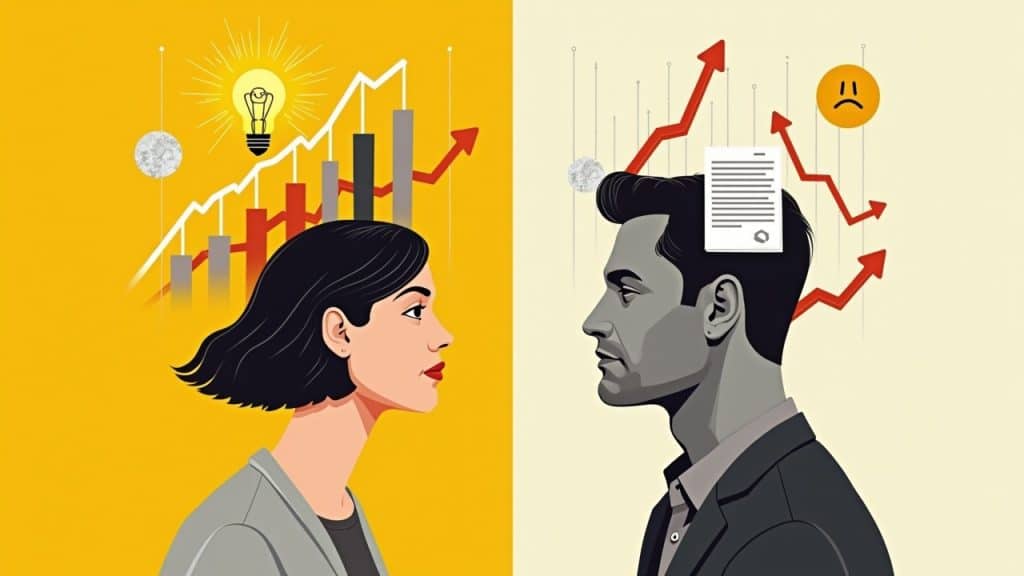Let’s get one thing out of the way: this isn’t about how much money you make. In fact, some of the most financially stressed people in the world earn six figures, and some of the most content, financially secure people live on modest incomes.
What actually makes the difference? Mindset.
The way we think about money—how we react to it, plan for it, talk about it, and use it—shapes everything. And the biggest gap between a rich mind and a poor mind often isn’t in the bank account… it’s in the daily habits that no one sees.
This isn’t about arrogance or judgment. It’s about self-awareness. So whether you’re climbing your way out of debt or already stacking your savings, here’s a breakdown of the small, subtle habits that create a rich vs poor mindset—and how they can change your entire financial trajectory.
The Language of Wealth (or Lack of It)
How we talk about money matters. A rich mindset often speaks in terms of possibility: “How can I afford this?” instead of “I can’t afford this.” It leans into questions, curiosity, and creativity.
People stuck in a poor mindset tend to speak in absolutes. “That’s too expensive.” “I’ll never be able to retire.” “I’m just bad with money.” These phrases feel final—like doors slammed shut.
The shift is subtle, but powerful. When you say “I can’t,” your brain stops trying. When you say “How can I?” your brain starts solving.

Spending vs Investing: Same Action, Different Mindset
A poor mindset tends to see money as something to be spent—used up quickly, traded for temporary satisfaction. A rich mindset sees money as a tool to create more. It’s not just about saving or hoarding—it’s about investing. And not just in stocks or real estate, but in things that grow: skills, relationships, health, opportunities.
Poor minds often buy to escape discomfort. Rich minds invest to build freedom.
Next time you pull out your card, ask yourself: Am I spending, or am I investing? One drains. The other multiplies.
Delayed Gratification vs Instant Pleasure
Let’s talk about the marshmallow test. You know the one—kids are given a marshmallow and told they can eat it now, or wait 15 minutes and get two. Turns out, the ones who waited tended to have better life outcomes later on.
That’s delayed gratification. And it’s at the core of a rich mindset.
We live in a world of tap-to-buy, same-day shipping, and endless scrolling temptation. But people with a rich mindset know that waiting is powerful. They save before they spend. They resist impulse purchases in favor of long-term wins. They’re playing chess, not checkers.
Poor mindsets prioritize now over later. But wealth—real wealth—lives in the long game.

Blaming vs Taking Ownership
Life’s unfair. That’s not news. But here’s the mindset divider: people with rich minds acknowledge the unfairness—and keep moving forward anyway. They take ownership of what they can control, even if it’s small.
A poor mindset gets stuck in blame. Blame the boss, the system, the economy, the government, the parents, the bills. And while some of those things might absolutely be factors, blaming them doesn’t lead to change.
Ownership does.
Even if the deck is stacked, rich mindsets look for the next best move. They stay in the game. That’s how you win.
The Company You Keep
Want to spot a rich mindset? Look at the people someone surrounds themselves with. Growth-minded folks hang out with other learners. They ask questions. They network. They have conversations about money that go deeper than “Did you see the price of gas?”
Poor mindsets often avoid talking about money—or only talk about what they can’t do, can’t afford, or wish they had. Or worse: they criticize those who do have money.
Surround yourself with people who make you think bigger. Not richer—bigger. People who talk about ideas, goals, and action. Your mindset will shift faster than you think.
How You Treat Time
Time is the ultimate currency. A poor mindset trades time for money in the most literal sense: hours for dollars. A rich mindset eventually figures out how to leverage time—by building systems, skills, or investments that pay off over and over again.
People with a rich mindset often ask, “What’s the best use of my time right now?” Not just what’s easy. Not just what pays today. But what builds momentum.
Poor mindsets fill time. Rich mindsets focus it.
Habits that Quietly Build Wealth
So how does this all show up in everyday life? Here are some of the low-key habits that rich-minded people tend to build:
- They check their bank account without fear
- They read (or listen to) something money-related at least once a week
- They plan for the next month, not just the next weekend
- They write things down: goals, budgets, ideas, progress
- They reflect on mistakes without letting them define them
- They make decisions based on values, not moods
- They automate the boring stuff (savings, bills, investing)
None of this is flashy. But it works.

The Role of Emotion in Money
Money is emotional. It taps into our identity, our fears, our self-worth. A rich mindset doesn’t ignore emotion—it works with it.
People with a poor mindset often let emotions drive their financial decisions. Stress spending. Avoiding bills. Avoiding conversations. Avoiding the truth.
Rich-minded folks feel the same emotions—they just don’t run from them. They pause, breathe, and act based on their bigger goals, not their passing feelings.
They understand that financial health is emotional intelligence in action.
It’s Not About Perfection—It’s About Direction
This isn’t a checklist to make you feel bad. Everyone falls into poor mindset patterns sometimes. What matters is that you notice them—and redirect.
The gap between rich and poor minds is full of small, invisible habits. It’s what you do when no one’s watching. How you think when you’re alone. What story you tell yourself when things go wrong.
And the best part? You don’t need a big break, a massive raise, or a lucky lottery ticket to change your mindset. You just need to start where you are, with what you have, and build better habits—one small shift at a time.
Your Mindset Is Your Money Strategy
If you’ve ever wondered why some people seem to grow their wealth no matter what, while others stay stuck even with a decent paycheck—the answer is rarely found in income. It’s found in habits and mindset.
So the next time you catch yourself saying “I’m just bad with money,” stop. Ask yourself: What would someone with a rich mindset do in this moment? Then do that—even if it’s just something small.
Because the truth is, your mind is your most powerful financial asset. And building a rich life? It starts there.
